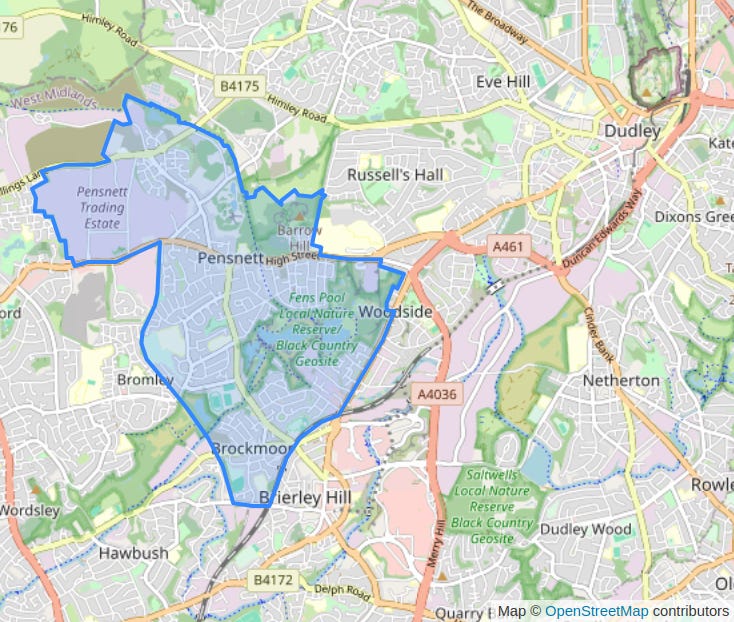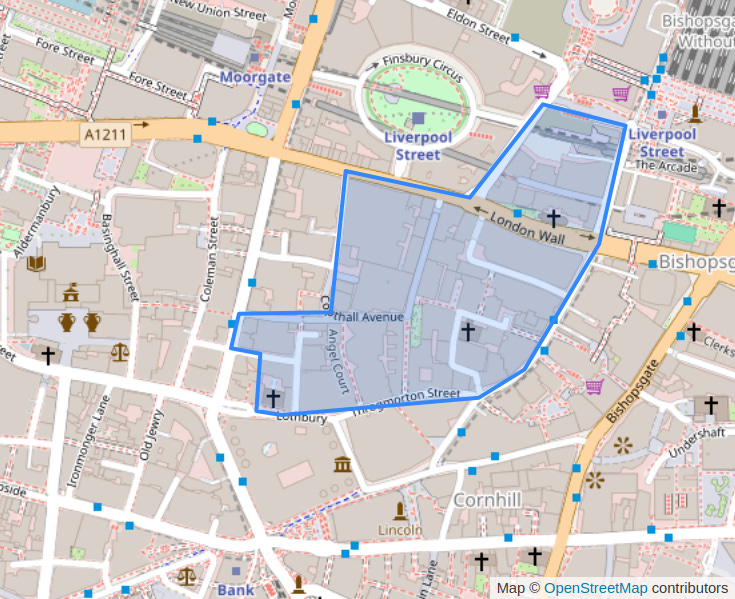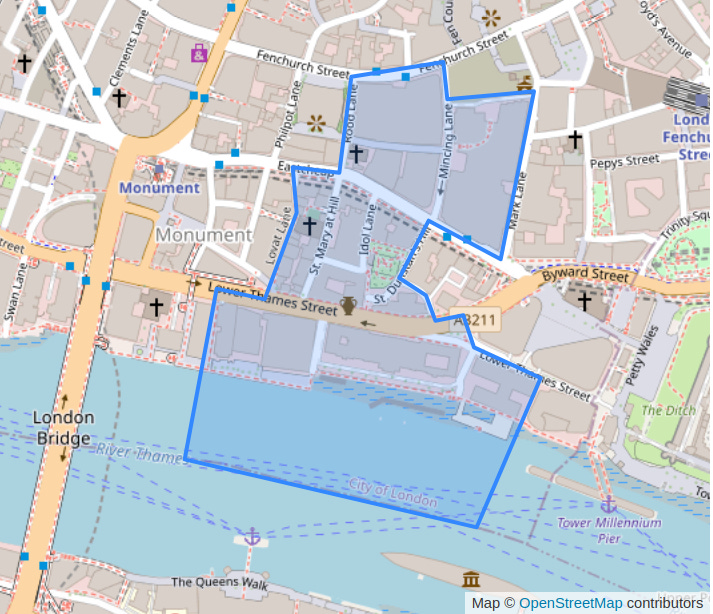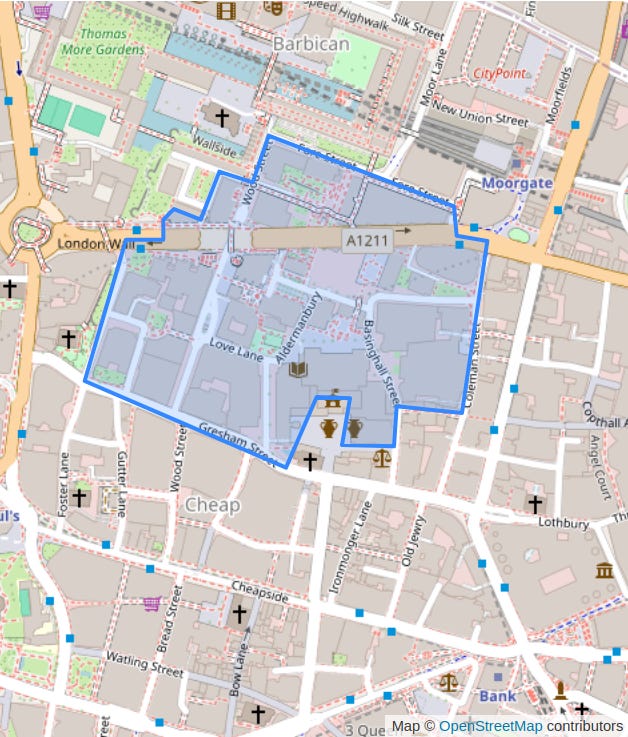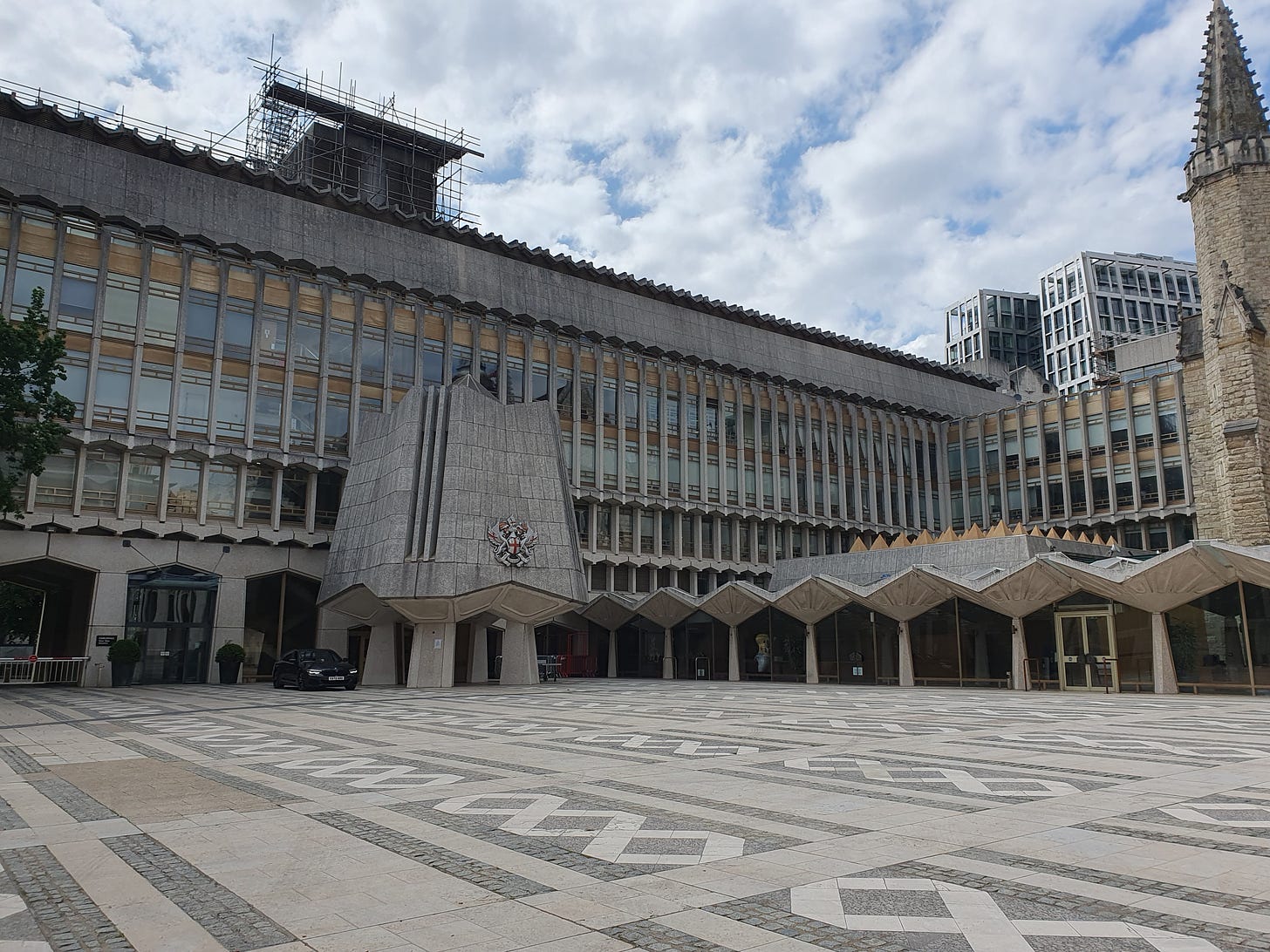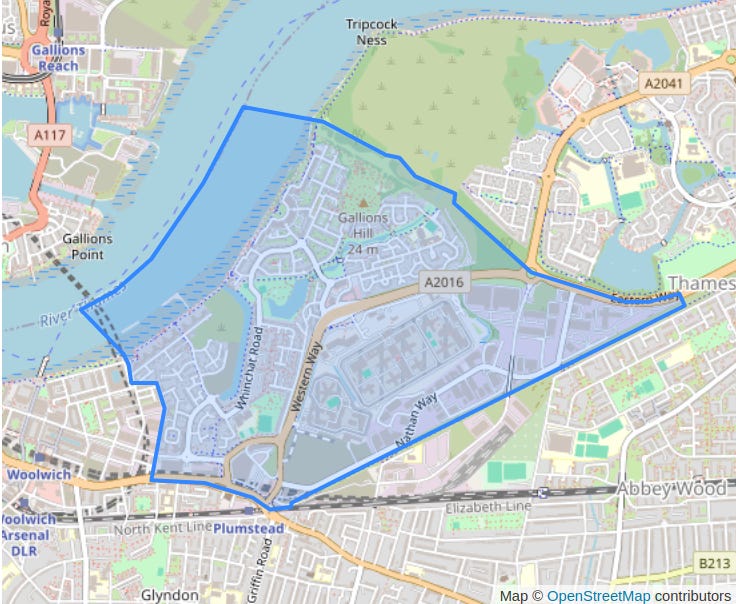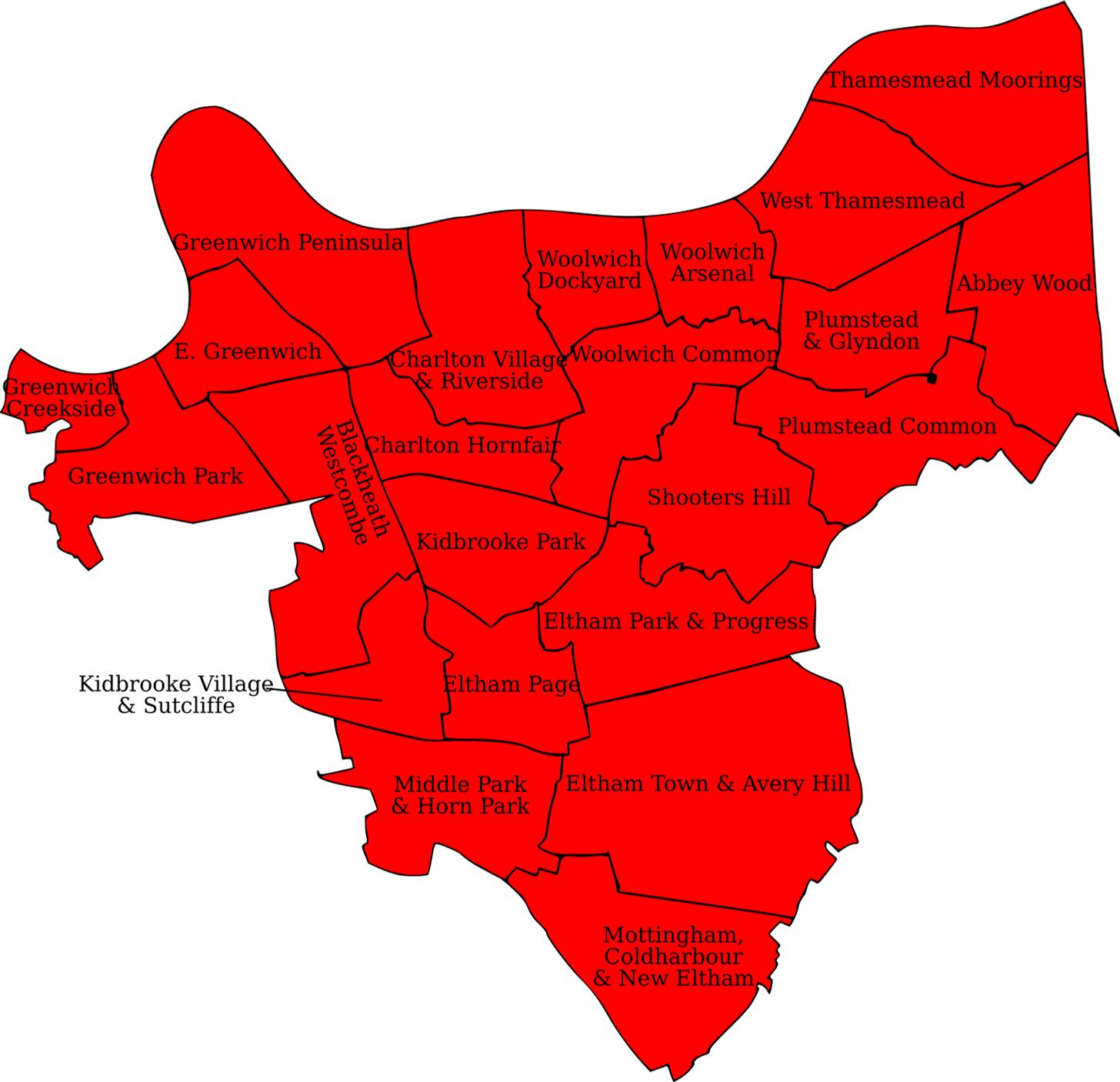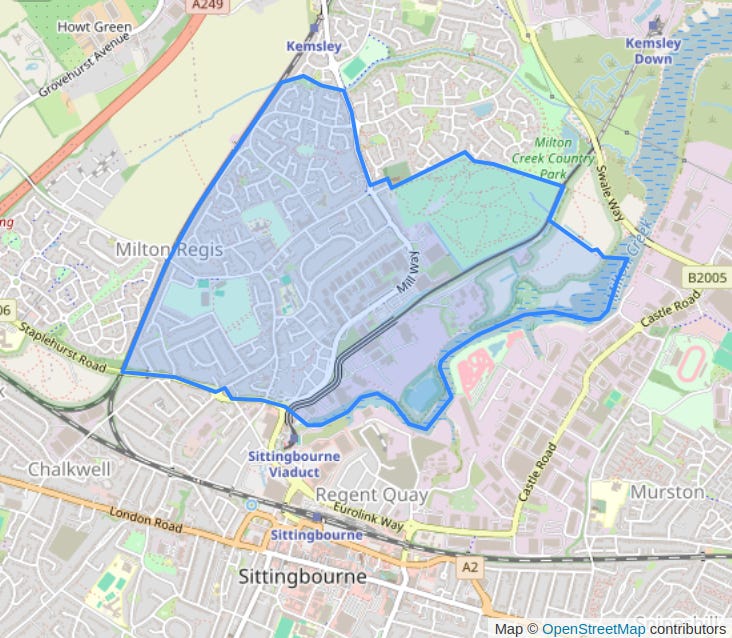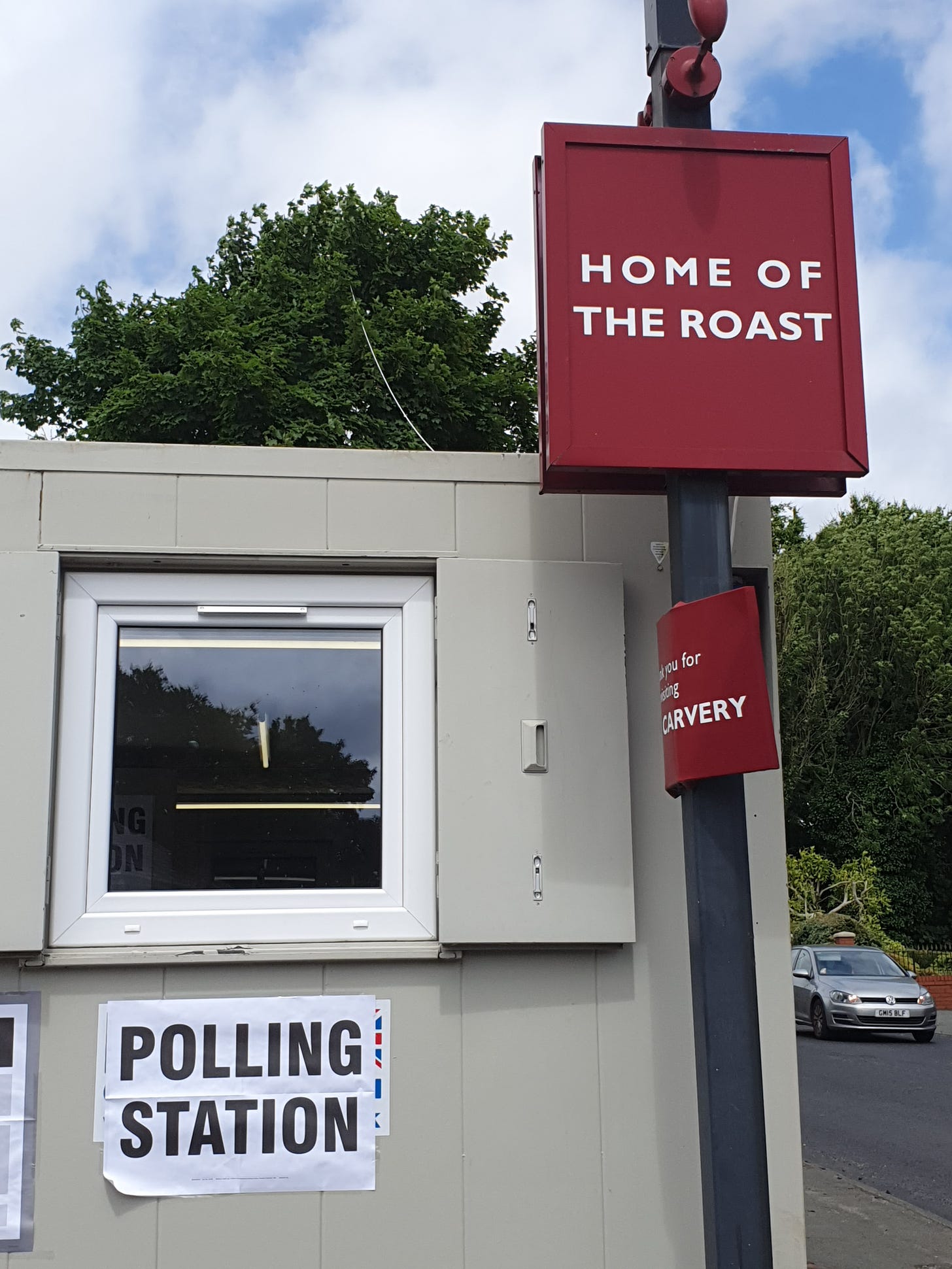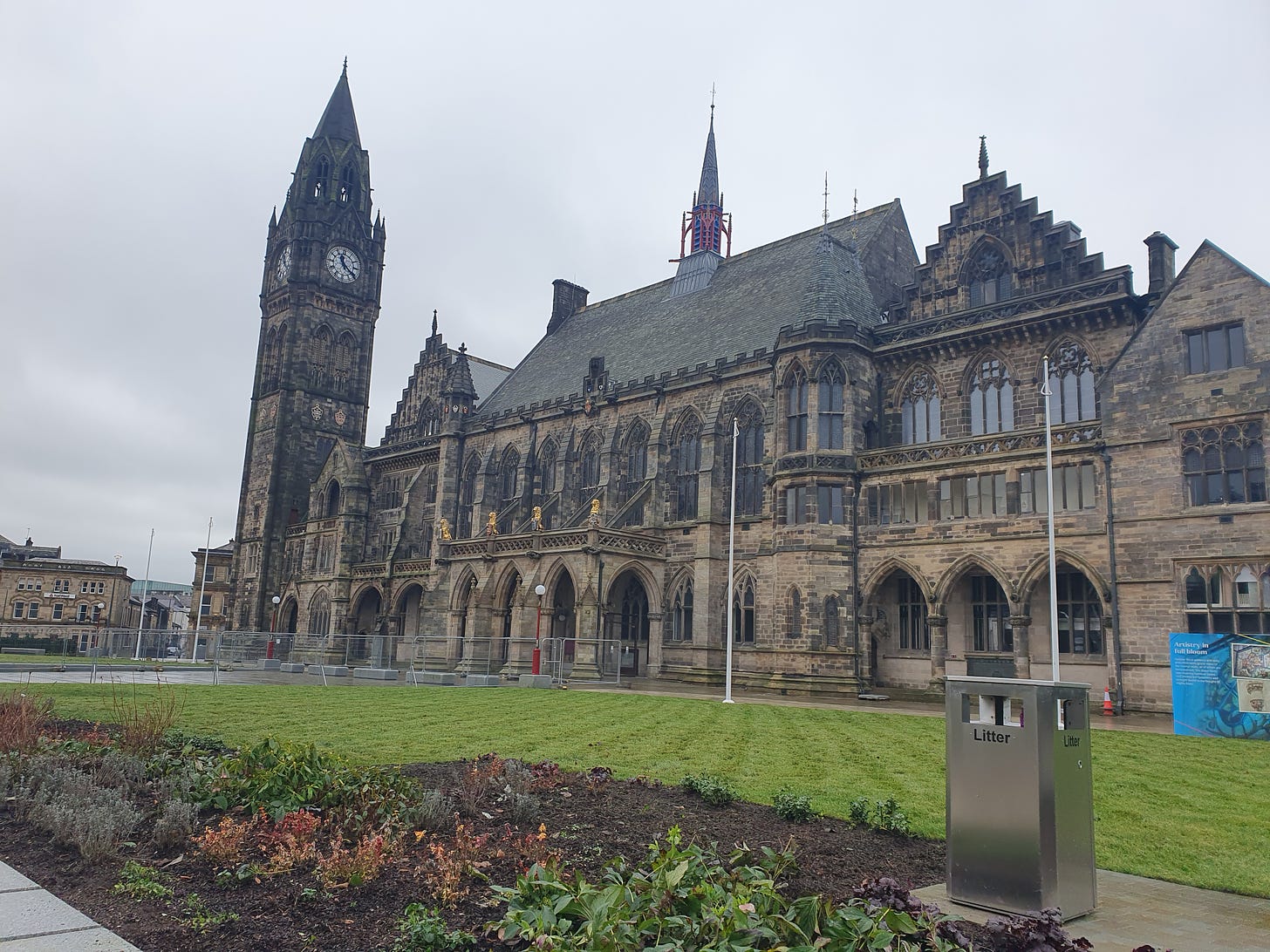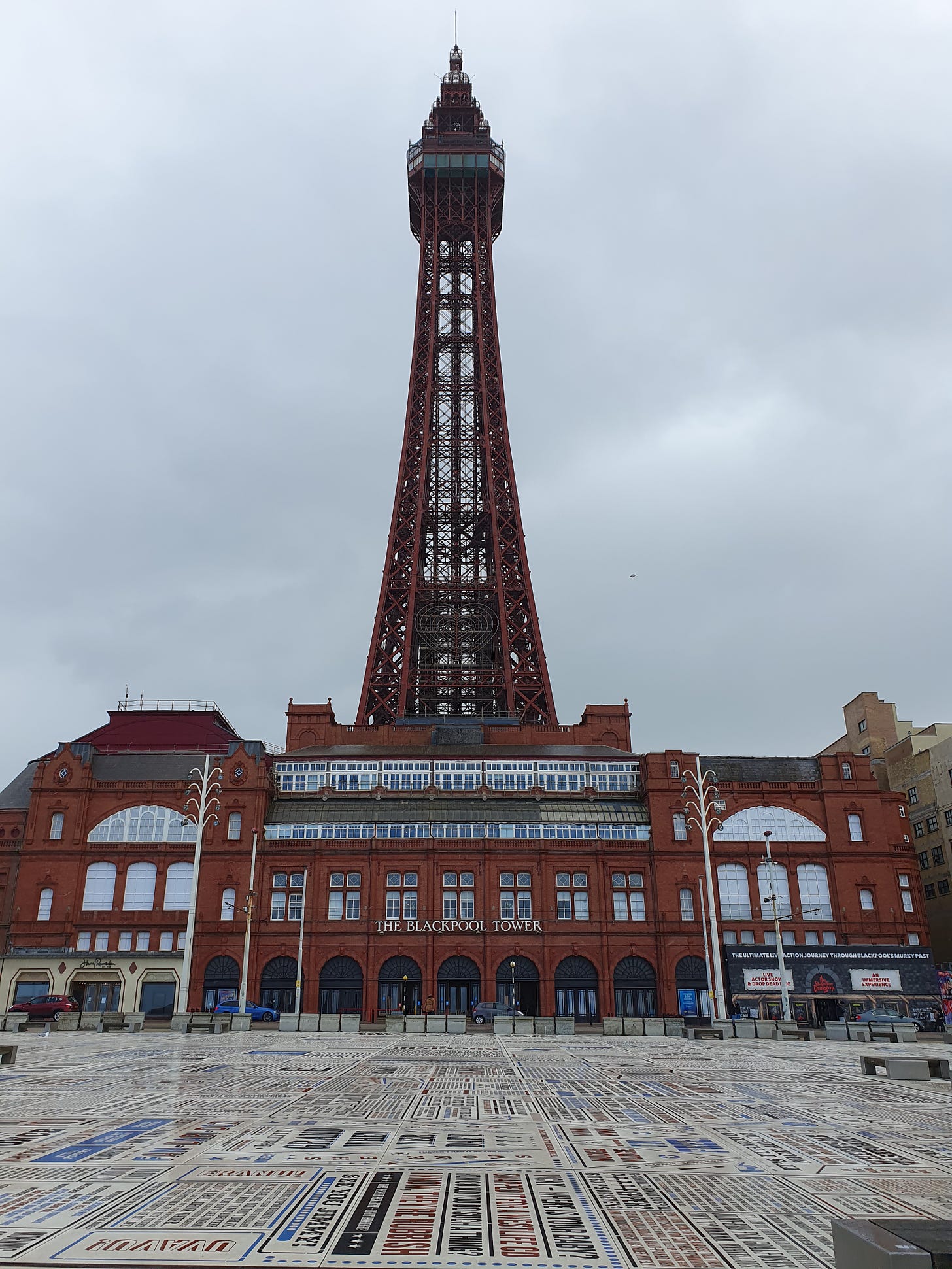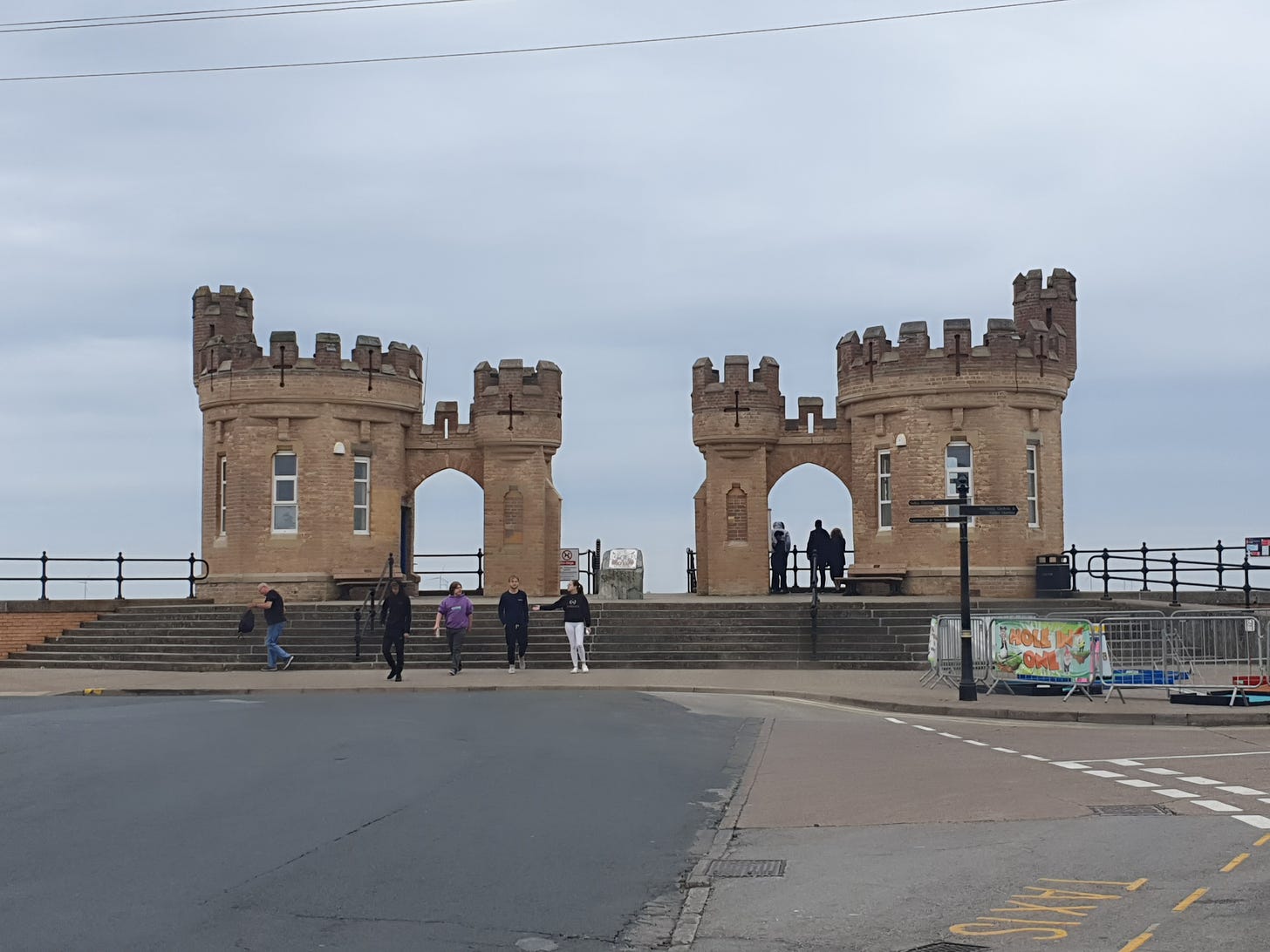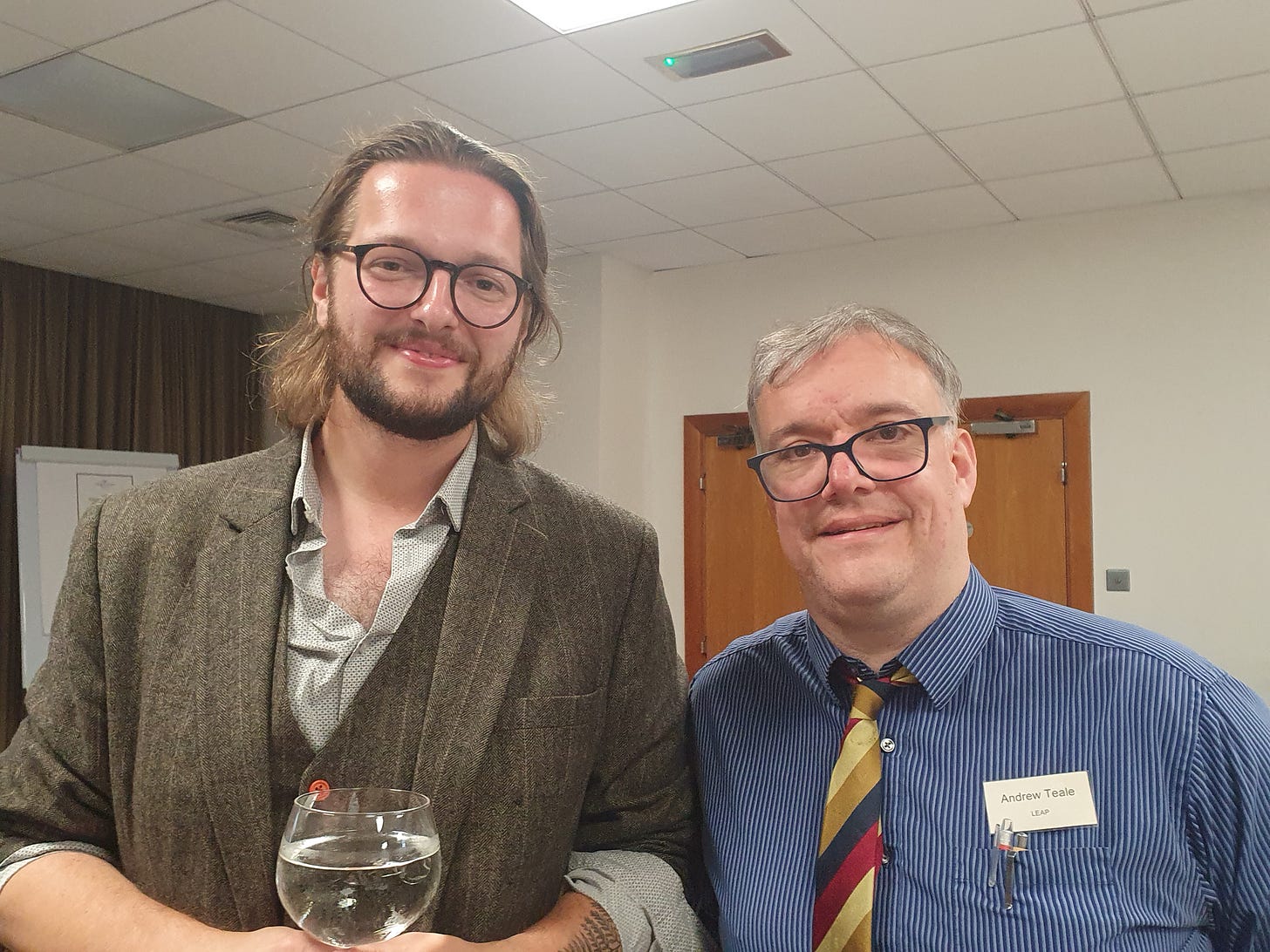Previewing the six by-elections of 19th December 2024
"All the right votes, but not necessarily in the right order"
Six elections on 19th December 2024, to finish off the year:
Brockmoor and Pensnett
Dudley council, West Midlands; caused by the resignation of Labour councillor Judy Foster.
It's the last week of council by-elections this year, and all our polls today are in the festive colours of red and white. We have three non-party Aldermanic elections in the fantasyland that is the City of London, and three polls in the rest of England to replace councillors who were originally elected bearing the red rosette.
We'll start by considering Brockmoor and Pensnett, two villages which were long ago swallowed up by the urban sprawl of the Black Country. Brockmoor lies immediately to the north-west of Brierley Hill town centre, with Pensnett being further north on the main road from Dudley to Kingswinford. The ward named after these areas is centred on green space: the Fens Pools, a series of flooded clay pits, now form a nature reserve. The Black Country made its reputation on metalbashing, and there was a major steelworks at Brierley Hill back in the day; this is long gone now, but there is still a large steel processing factory in Brockmoor and Pensnett ward. The large Pensnett Trading Estate also provides jobs here. In the 2021 census the ward reported a working-class demographic, with high levels of social housing.
Brierley Hill was once the centre of a constituency of its own, which was formed in 1950: this covered Brierley Hill, Amblecote and Kingswinford at the western end of the Black Country, together with Staffordshire's rural south-western corner and the middle-class Wolverhampton suburb of Tettenhall. The constituency voted Labour in 1950 and 1951, then Conservative thereafter. Brierley Hill urban district was broken up in 1966 - a decision which is still locally controversial - and the constituency followed suit into oblivion in 1974. Since then Brockmoor and Pensnett have been linked with Dudley for parliamentary representation, and it is part of the modern Dudley parliamentary constituency which turned in a three-way marginal result this year. Labour's Sonia Kumar, an NHS physiotherapist, defeated the previous Conservative MP for Dudley North Marco Longhi by 1,900 votes with Reform UK not far behind Longhi in third place.
From Reform UK's point of view, their 26% score across the Dudley constituency was very much an improvement on the Dudley council elections two months previously, in which RUK only contested three wards out of a possible 24. Brockmoor and Pensnett was not one of them. This is a normally Labour-inclined ward, although the BNP came close to winning in 2007 and the Conservatives broke through in 2008, 2021 and 2022. This year the whole of Dudley council was up on a new ward map (although the changes from the old lines were pretty minimal), meaning that the ward's one remaining Conservative and two Labour councillors all came up for election at once. The Conservative saw the writing on the wall and she did the chicken run to a safer ward, and Labour went on to win all three seats in Brockmoor and Pensnett by the comfortable margin of 64-28 over the Conservatives.
This wasn't enough for Labour to take control of Dudley council, though. The all-out 2024 council elections for Dudley's 72 seats resulted in no overall control, with Labour and the Conservatives tied on 34 seats each and three Lib Dems holding the balance of power. The previous Conservative administration has continued in office as a minority, but they have had to concede the mayoralty - and its casting vote in the event of a tie - to Labour.
Today's by-election is to replace long-serving Labour councillor Judy Foster, who resigned in November citing concerns about her personal safety. Foster was the deputy leader of the Labour group and had previously served as deputy leader of the council. She was first elected to Dudley council all the way back in 1998, and she had represented Brockmoor and Pensnett ward since 2004.
To defend this ward Labour have gone for experience in selecting Karen Jordan, who previously represented Brockmoor and Pensnett on Dudley council from 2004 to 2019 (when she stood down). Alex Dale is back for the Conservatives after he finished as a rather distant runner-up here in May. Also on the ballot are David Sheppard for the Lib Dems, Ant Dugmore for the Greens, independent candidate Cassie Gray and Richard Tasker for Reform UK.
Parliamentary constituency: Dudley
ONS Travel to Work Area: Dudley
Postcode districts: DY1, DY5, DY6
Alex Dale (C)
Ant Dugmore (Grn)
Cassie Gray (Ind)
Karen Jordan (Lab)
David Sheppard (LD)
Richard Tasker (RUK)
May 2024 result Lab 1382/1310/1246 C 617/573/560 LD 173
Previous results in detail
Bassishaw;
Billingsgate; and
Broad Street
City of London Corporation; Aldermanic elections caused respectively by the resignations of Timothy Hailes, Bronek Masojada and Michael Mainelli.
We now come to three polls to fill vacancies on that most curious of the UK's democratic bodies, the City of London Corporation. This is divided into the Court of Common Council, which consists of 100 members who are next up for re-election in March 2025; and the Aldermanic bench, the senior councillors from whom the Lord Mayor and other City officers are selected each year. There are 25 Aldermen, one for each ward, and they are technically elected for life but are expected to seek re-election at least every six years. Aldermanic elections are not synchronised and they happen as and when required, so today we have polls in three of the City's 25 wards.
All three of the outgoing Aldermen are seeking re-election, and the most senior of them is Michael Mainelli who has recently finished his year in office as the 695th Lord Mayor of London. Retiring Lord Mayors usually get something in the following New Year honours list, so presumably Mainelli can look forward to adding to his current honour of Knight of St John in a couple of weeks' time. (Knights of St John do not get the title Sir or Dame.) Mainelli, who is originally from Seattle in the USA, is a chartered accountant and former scientist and academic; he co-founded and chairs a think tank called Z/Yen. He was first elected in 2013 and he was re-elected without a contest in December 2018 as Alderman for Broad Street ward, which covers the area between the Bank of England and Liverpool Street (both exclusive) and is dominated by banking and financial institutions. The ward includes the churches of All Hallows-on-Wall and St Margaret Lothbury, and the polling station for this election is the Furniture Makers' Hall.
Michael Mainelli is now seeking his third and probably final term of office: he is 65, and Alderman are expected to retire at the age of 70. This time he faces a challenge from Josephine Hayes, who is a barrister specialising in property litigation and general Chancery. Hayes has a long previous history in the Liberal Democrats - she was the party’s parliamentary candidate for Witham in 2015 and 2017, she stood on their list for the Eastern region at the 2014 European Parliament elections and she was a Lib Dem member of Colchester council from 2012 to 2016 - but she was thrown out of the party a few years ago. Even if Hayes had still been a Lib Dem member she would almost certainly have been on this ballot paper as an independent nonetheless, because that's how City elections work.
On the City's shoreline we find Billingsgate ward, which was historically dominated by docks and markets next to the Thames. Its polling station is the Watermen's Hall. Billingsgate Fish Market was here until 1982, when it moved to a new location in Canary Wharf which may not be much longer for this world: the City Corporation has recently voted to close both Billingsgate and Smithfield Markets from 2028.
The name of Billingsgate refers to an ancient watergate of Roman Londonium, and another vestige of that time is a Roman bathhouse whose excavated remains lie underneath a skyscraper on Lower Thames Street, diagonally opposite the old market building. Tours of the Billingsgate Roman House and Baths take place on Saturdays between April and November - prebooking required - and your columnist can strongly recommend a visit.
Today Billingsgate ward is dominated by the insurance industry, and its Alderman since January 2019 (Andrew's Previews 2019, page 15) has been Bronek Masojada who was CEO of the insurers Hiscox from 2000 to 2021. He is originally from Durban in South Africa, and last time he polled 52 votes (48% of the total) against a scattered field of five other candidates - although effectively that was four other candidates, because not a single vote was cast for the official SDP candidate Jonathan Bergdahl. Masojada has recently completed a year as one of the two Sheriffs of London, the stepping-stone to becoming Lord Mayor, and he is line for the Lord Mayoralty in 2027-28. This, of course, is subject to him securing re-election - and he has been challenged by Aneesa Hussain, who is a solicitor working for the Canadian Imperial Bank of Commerce.
We'll finish back on the north side of the City by considering Bassishaw ward, which covers most of the Guildhall complex from where the City Corporation is run and is also home to many financial and investment firms. One survivor of earlier times is a section of the old London Wall in Salter's Garden - rather off the line of the modern street of that name - while the public square in front of the Guildhall is on the site of an old Roman amphitheatre, whose remains can be seen in the basement of the adjacent Guildhall Art Gallery. This is on your columnist's list of places to visit when I am next in London.
Since 2013 Bassishaw ward's Alderman has been Tim Hailes, another City solicitor who worked for many years for the US bank J P Morgan. He was last re-elected in April 2019 (Andrew's Previews 2019, page 99) by 118 votes to Ian Bishop-Laggett's 55, having won in 2013 without a contest. Hailes was involved in Conservative politics when he was a student, and he served in 1988-89 as a sabbatical officer of the King's College London students' union. He was the first openly gay Alderman to serve as a Sheriff of London, doing so in 2017-18, and he has been recommended as a future Lord Mayor of London: a date of 2026-27 is pencilled in for Hailes' mayoral year if he can secure re-election. As in the other two City polls today, we have the outgoing Alderman challenged by one female candidate: in Bassishaw that's (Cecile) Leyla Boulton, who is a journalist and senior editor at the Financial Times. Polling for this by-election will be at the Guildhall.
The wards up for election today are all dominated by businesses, and the number of permanent residents who live in Bassishaw, Billingsgate and Broad Street wards put together is comfortably under 50. Under the City's unique form of plural voting, the electors in these polls will be that handful of residents, sole traders working in the ward, and people who work in the ward and are nominated by their employers. If you want to know more about this process, my friends at Democracy Club have an explanation here (link).
Bassishaw
Parliamentary constituency: Cities of London and Westminster
London Assembly constituency: City and East
ONS Travel to Work Area: London
Postcode districts: EC2R, EC2V, EC2Y
Cecile Boulton (Ind)
Timothy Hailes (Ind)
Previous results in detail
Billingsgate
Parliamentary constituency: Cities of London and Westminster
London Assembly constituency: City and East
ONS Travel to Work Area: London
Postcode districts: EC3M, EC3R
Aneesa Hussain (Ind)
Bronek Masojada (Ind)
Previous results in detail
Broad Street
Parliamentary constituency: Cities of London and Westminster
London Assembly constituency: City and East
ONS Travel to Work Area: London
Postcode districts: EC2M, EC2N, EC2R
Josephine Hayes (Ind)
Michael Mainelli (Ind)
Previous results in detail
West Thamesmead
Greenwich council, London; caused by the resignation of Chris Lloyd.
Further down the Thames, but still in Greater London, we come to some of the capital's newest housing. Thamesmead is essentially a municipal New Town, built on the south bank of the Thames on marshland within the boroughs of Greenwich and Bexley which was previously part of the Woolwich Arsenal site. West Thamesmead forms a later phase of this development, mostly built in the 1990s and lying close to Woolwich town centre; Plumstead railway station lies just off the ward's southern boundary. The ward includes Gallions Reach Park, which is named after a section of the River Thames overlooked by the 24-metre summit of Gallions Hill: it is not to be confused with the Gallions Reach station on the Docklands Light Railway, which is on the other side of the river.
The development of West Thamesmead coincided with a large wave of immigration to London from Nigeria, Ghana and other countries in West Africa, and Thamesmead as a whole became a very popular destination for citizens of those countries. In the 2021 census West Thamesmead ranked at number 4 in England and Wales for residents born in Africa, at 18.3%; the three wards with a larger African-born population were Peckham and the two other Thamesmead wards. West Thamesmead ranks at number 11 for black population (37.6%), in the top 30 for mixed-race population (8.6%) and in the top 70 wards for unemployment (7.4%).
The unemployment figure here does not include another 13.2% of West Thamesmead residents classed by the census as "economically inactive: other", which is the highest figure for any ward in London and in the top 25 for England and Wales. This is due to the presence here of over 1,000 prisoners at the Isis young offenders' institution, Thameside prison and the notorious HMP Belmarsh, which was completed in 1991 and in which some of the UK's most infamous criminals are incarcerated. Belmarsh prison is linked by a tunnel to the adjacent Woolwich crown court, which is the UK's preferred venue for terrorism trials or other trials for which particularly high security is required; as such, there are a number of remand prisoners held in Belmarsh awaiting their trials. Only the remand prisoners in Belmarsh, Isis and Thameside are eligible to vote.
West Thamesmead ward is part of the safe Labour constituency of Erith and Thamesmead, which appropriately enough is represented by an MP of Ghanaian descent: Abena Oppong-Asare has been the MP here since 2019. The ward was created by a 2022 boundary review, from territory which was previously in Glyndon ward or Thamesmead Moorings ward, and it returns two Greenwich councillors. The 2022 Greenwich election, which returned a 62-15 lead for Labour over the Green Party, is the only previous result on these lines.
This is the fourth by-election of 2024 to Greenwich council, and the third in three months: Labour held a seat in Shooters Hill ward last month but in October they lost Eltham Town and Avery Hill ward to the Conservatives. October's by-election was provoked by the resignation of Labour councillor Samuel Backon; now we have to find a replacement for Backon's partner Chris Lloyd, who had served on Greenwich council since 2014. Lloyd originally represented Peninsula ward before transferring to West Thamesmead in 2022.
Chris Lloyd was the Labour parliamentary candidate for Brecon and Radnorshire in 2010, and in 2022 he briefly held the Labour nomination for the target seat of Swindon North before withdrawing his prospective candidacy due to work commitments. Lloyd then had a falling out with the Labour party which resulted in him becoming an independent Greenwich councillor in January this year; in May he went on to join the Liberal Democrats, becoming the only Lib Dem member of Greenwich council until his resignation six months later. He has reportedly moved to Wales for family reasons.
So this by-election is technically a Liberal Democrat defence, and their candidate Steve Day has it all to do to hold this seat after the Lib Dems finished last here in 2022 with 8.4% of the vote. Day is the chair of the residents' association for Royal Artillery Quays, a series of residential towers on the ward's Thames shoreline which were built with dangerous cladding that needs removing. Labour will want their seat back and they have selected Jahdia Spencer: she is a Bermudian who came to London ten years ago and works as a swimming teacher. Standing for the Greens is Anji Petersen, who contested Plumstead Common ward in 2022. Completing the West Thamesmead ballot paper are Siama Gulnar Qadar for the Conservatives (she was their candidate in the Lewisham mayoral election in May) and Ruth Handyside for Reform UK.
Parliamentary constituency: Erith and Thamesmead
London Assembly constituency: Greenwich and Lewisham
ONS Travel to Work Area: London
Postcode districts: SE2, SE18, SE28
Steve Day (LD)
Siama Gulnar Qadar (C)
Ruth Handyside (RUK)
Anji Petersen (Grn)
Jahdia Spencer (Lab)
May 2022 result Lab 1085/967 Grn 263 C 259/210 LD 148
Previous results in detail
Milton Regis
Swale council, Kent; caused by the resignation of Labour councillor Angelica Valls.
We finish for the week further down the North Kent railway in the town of Sittingbourne. Or, more accurately, in Milton Regis which is now a northern suburb of Sittingbourne but was once an urban district of its own. In fact, Milton Regis is a lot older than Sittingbourne: history records that Queen Seaxburh of Kent became a nun here in AD 680, and the town was sacked in 1052 by Godwin, Earl of Wessex, in a dispute over the Anglo-Saxon throne. In recent decades Milton Regis' economy was based on paper manufacturing and Milton Precast, which still makes concrete pipes in the ward today. This was traditionally an industrial and working-class area, and it has demographics to match.
The present boundaries of Milton Regis ward date from 2015, when the ward elected one Conservative and one UKIP councillor. It seems that this came as a bit of a surprise to both parties, as the previous Milton Regis ward had been safely Labour in 2011 and both the Tories and UKIP only had one candidate. The UKIP councillor Katy Coleman then died in 2017 at the early age of 45, and Labour easily won the resulting by-election (Andrew's Previews 2017, page 208). Labour then had no trouble gaining the Conservative seat in 2019, and the 2023 Swale council election gave Labour a 58-26 lead over the Swale Independents in Milton Regis ward. The Swale Independents are a partner in the Labour-led coalition which runs Swale council.
The Conservatives do represent this area on Kent county council as part of the Sittingbourne North county division. The Sittingbourne and Sheppey parliamentary seat has voted for the winning party at every election since its creation in 1997, although the Labour MP Kevin McKenna won here in July by only 355 votes over the Conservatives; he polled just 29% of the vote in a freak vote split, with 28% going to the Conservatives and 26% to Reform UK.
This by-election is to replace Labour councillor Angelica Valls, who was first elected in 2023 and tendered her resignation last month for undisclosed reasons. The defending Labour candidate is Nicola Nelson, who previously contested Sheerness ward in 2019 and at a 2021 by-election. The Swale Independents, who successfully defended a by-election in a different Sittingbourne ward last month, have selected retired police officer Tom Lee. Also standing are Islay Walker for the Conservatives, Kieran Mishchuk for Reform UK and Marc Wilson for the Liberal Democrats.
Parliamentary constituency: Sittingbourne and Sheppey
Kent county council division: Sittingbourne North
ONS Travel to Work Area: Medway
Postcode district: ME10
Tom Lee (Swale Ind)
Kieran Mishchuk (RUK)
Nicola Nelson (Lab)
Islay Walker (C)
Marc Wilson (LD)
May 2023 result Lab 674/559 Swale Ind 303 C 186/166
May 2019 result Lab 635/446 Swale Ind 434 C 244/171 LD 103
August 2017 by-election Lab 573 C 255 UKIP 151 LD 86
May 2015 result C 993 UKIP 849 Lab 845/754 LD 252
Previous results in detail
"The same procedure as last year, Miss Sophie?"
The Swale by-election above will be the last UK election result of 2024 when it declares on Friday. With next Thursday being Boxing Day - 26th December - and thus a bank holiday, that is that for the electoral year of 2024. Christmas and New Year is not a time for politics: it's a time when family comes first, and when tradition takes over.
The tradition here at Andrew's Previews is to finish the last piece of the year with some personal notes and votes of thanks. It's the same procedure as last year, and indeed the same procedure as every year: we toast the new year, bid farewell to the old, and wonder whether the next 12 months will be an improvement on the last.
In last year's piece, I noted that from a national polling point of view, the curious incident of 2023 was that nothing had changed. The political scene was essentially static, with an unpopular Conservative government heading for a heavy defeat at the following general election and having clearly run out of ideas which could save them from their fate. Still nothing had changed by the time of the May 2024 local elections, which saw big Conservative losses.
And those national polls were more or less borne out by the big one. When the general election came on 4th July, the Conservatives went down to exactly the heavy defeat the opinion polls were suggesting and Sir Keir Starmer's Labour party won a stonking majority comparable to Blair at his peak. But Labour's vote share was definitely not up to the standards set by Sir Tony, and that reflects the increasing political fragmentation over the last 20 years. The left flank of Labour's vote has been nibbled away at by the Greens and by independent candidates, while Reform UK ate away at both of the major parties' votes but clearly took more from the Conservatives.
The 2024 general election also had the lowest turnout on record. Local by-elections since then have continued that trend, with most polls now struggling to reach votes cast by even 20% of the electorate. This trend is not a good one for democracy, and we have now reached the stage where efforts need to be made to improve turnout in our elections. Making it easier to vote is an obvious place to start.
So far all that has been done on that front is to add the HM Armed Forces Veteran Card as acceptable photo ID for elections. This sounds like a simple administrative change - but the three statutory instruments which implemented it run to an astonishing total of 116 pages of legislation using powers conferred by eleven different Acts of Parliament.
There can be no clearer indication of just how complicated and fragmented the UK's electoral law has become. Its last consolidation, the Representation of the People Act 1983, is older than your columnist and dates from a simpler time. In 1983 there was no Scottish or Welsh Parliament or Northern Ireland Assembly; there were no elected local authority mayors; there were no elected police and crime commissioners; there were no recall petitions for MPs Behaving Badly; referendums were almost unknown; there was no Voter ID; and every election in Great Britain used the same electoral system, namely first past the post.
All of the constitutional innovations we have seen over the last 41 years have had to be bolted onto the framework of the 1983 Act, which is now visibly collapsing under the added weight. That is why we have reached the point where adding one item to a list of acceptable photo ID generates 116 pages of legislation. And the next time the list gets changed, presumably that will be another 116 pages.
This is not a new problem by any means, and our electoral services professionals have been calling for electoral law to be simplified and consolidated for well over a decade. The Law Commission started work on a potential consolidation all the way back in 2012, and essentially abandoned it in 2016 although a final report pathetically calling for action did eventually appear in 2020. You will be shocked to hear that nothing further was done to sort out this Gordian knot of legislation and help out the electoral services teams who have the job of interpreting it all for your benefit. If they can't follow all this, the rest of us have no chance.
And our electoral services teams have certainly had a busy time this year. As well as the general election, there were local elections in some form taking place throughout England and Wales; parliamentary by-elections in Kingswood, Wellingborough, Rochdale (above) and Blackpool South (below); and a massive number of local by-elections. A countup reveals that Milton Regis, when it declares tomorrow, will be the 365th and last seat of the year filled in a local by-election. If it weren't for the inconvenient fact that 2024 was a leap year, that would be exactly one per day.
Of the 359 seats in so far, 141 have gone to Labour (a net loss of 25), 96 to the Conservatives (a net gain of 19), 65 to the Liberal Democrats (a net gain of 5), 21 to independent candidates or localist parties (a net loss of 10), 17 to the Green Party (a net gain of 7), 7 to Reform UK (all gains), 5 to the Scottish National Party (a net loss of 2) and 3 to Plaid Cymru (a net loss of one). In those polls up to and including the general election date Labour had broken even while the Conservatives were sitting on a net loss of four, so we can see the early struggles of the new Labour government clearly reflected in the aggregate by-election scores.
Recent national polling suggests that the Labour lead from the general election has more or less dissipated, with Labour and the Conservatives neck and neck and Reform UK improving but still in third place. It helps Reform UK's cause that they have started taking local by-elections seriously since the general election, and in recent weeks most polls have had a Reform UK candidate on the ballot - giving their voters somebody to support. Their first ever local by-election win came on the undercard of the general election, in the East Riding ward of South East Holderness - covering the minor seaside resort of Withernsea (below) and a large surrounding rural area.
Assuming that we get local elections in May 2025 in some form, a tie in the national polls would actually represent a substantial swing away from the Conservatives. Next year's local elections are mostly to renew the county councillors elected in May 2021, at the height of the Conservatives' COVID vaccination bounce; the BBC's projected national vote share gave 36% to the Conservatives, 29% to Labour and 17% to the Liberal Democrats. The number of seats up for election next year is quite small - this will be the smallest set of local elections for many years with the exception of 2020, which we do not talk about - but those seats are concentrated in rural England, with very few urban areas going to the polls. The Conservatives are defending a large majority of the seats up for election in five months' time.
However, the Labour government's recent White Paper on local government made it pretty clear that they see no value in the two-tier structure of our local councils which struggled to its fiftieth anniversary this year. The UK already has the most remote local government in Europe, and this looks likely to get even worse. This column has previously made its view clear that reorganisations which created situations like Settle, Selby and Scarborough all having their local government run from faraway Northallerton are abominations which bring the entire concept of "local" governemnt into disrepute. But nobody listens to me. Maybe this column will end up in due course like Miss Sophie in Dinner for One: talking about long-gone councils as if they were still in the room, while our few remaining elected representatives rush around behind the scenes trying to pretend that this is all fine.
The new government clearly only want to talk to combined authority mayors, and there are four of these up for election in May: Labour are defending the posts of Cambridgeshire and Peterborough, and West of England; while we will get new mayoral posts for "Greater Lincolnshire" and "Hull and East Yorkshire". Local authority mayors are also up for re-election in Doncaster and North Tyneside.
Any local government reorganisation may well put in jeopardy the jobs not just of our local councillors but also of our local council staff. Which is awkward for the purpose of writing about elections, because these are the people who organise and staff our polls: these are the people who work hard for you all year round to keep the democratic show on the road, often without a word of thanks or appreciation from the wider electorate. We should put that right. This column's annual first vote of thanks goes to our election staff, without whom we literally couldn't run this country. Thank you. You've all worked hard this year. Have a well-earned Christmas break, and if you have elections to run in 2025 may they run smoothly.
Our second toast is to the people who participate in our elections, whether as a candidate or as a voter. If you hadn't stood for election, or if you hadn't gone to the polling station and put your vote on a piece of paper, then I would have nothing to write about. Last year's UK elections featured in total tens of thousands of candidates and tens of millions of voters, and you all contributed. Thank you.
And my third vote of thanks is to you, the reader. Andrew's Previews made the jump two months ago from Medium to Substack, and I am very satisfied with the new home. In that short time nearly 500 people have signed up to receive the Previews by email, including some rather big names in the psephological world. If you're not already on my little list, there's nothing to stop you signing up for free.
But if you do want to make a financial contribution to the Previews, there are presently two ways to do so. One is to click the donation link at the bottom of this piece; the other is to buy your copy of Andrew's Previews 2024, the ninth annual collection of the Previews, when it comes out at some point in the new year. It'll be ready when it's ready, and the royalties will be appreciated. Or if you can't wait until the 2024 collection is ready, the eight earlier collections, for 2016 to 2023, are and will remain available from Amazon at your convenience.
Those kind people who have made donations over the last year have helped to defray not just the general running costs of the research required to keep this going, but also research trips to Rochdale, Blackpool South and a couple of wards within striking distance of Bolton, including Withernsea. I hope the Parliamentary Specials for Rochdale and Blackpool South were improved by that.
The Previews are built on the foundation of the Local Elections Archive Project, which is now in its 22nd year as one of the largest online repositories of UK local election results. At the time of writing the LEAP database has details of 390,392 candidacies in 83,678 wards, with details going back to May 2002 and complete coverage up to May 2021. Work on filling in the remaining gaps for 2022 is ongoing. How long will it be before we crack 400,000 candidacies?
My final Christmas vote of thanks goes, as always, to our wonderful hosts at Britain Elects for not sacking me and for continuing to give this column a home. Councillor Ben Walker (he runs the Britain Elects social media, not me) continues to scrabble around for results while putting his experience and data into his website State of the Nation. His prediction models for the last general election were not far off the mark at all; and he'll have a few years to perfect the model for the next one. Ben was good enough to throw an election night party in July in his Chester city centre ward, which I attended and had a good time at. It gave me the opportunity to meet Ben in person for the first time. He's surprisingly tall.
The Britain Elects team there, hard at work for your benefit. On the election front 2025 will not be as manic as the year just gone, but whatever happens in the next twelve months all of the Britain Elects team will bring it to you, as it happens, as we stand ready to go through the same procedure as every year.
"The same procedure as last year, Miss Sophie?"
"The same procedure as every year, James!"
Well, I shall do my very best. To play us out for the year, as usual we turn to the Foden's Band - presently the number 2-ranked brass band in the world, behind only Brass Band Treize Étoiles from Switzerland - for some seasonally appropriate music. Because what's Christmas without a brass band? This year's delight is the traditional carol Once in Royal David's City, as you've never heard it before.
And without that Andrew's Previews will now close down for the year in the form of words which has become traditional. This column will return in time for the first local by-election of 2025, to be held in Devon on 9th January; until then, on behalf of Britain Elects may I wish you a very merry Christmas, and may your 2025 be an improvement on your 2024.
If you enjoyed these previews, there are many more like them - going back to 2016 - in the Andrew's Previews books, which are available to buy now (link) and would make an excellent Christmas present. You can also support future previews by donating to the Local Elections Archive Project (link).
Andrew Teale




